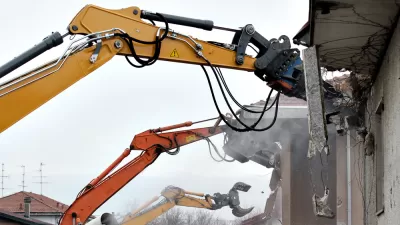Detroit's aggressive blight reduction strategy, to demolish vacant homes by the thousands, is coming under scrutiny for rising costs. The FBI and the U.S. Inspector General are investigating.

Matt Helms reports on the latest details of an expanding federal investigation in Detroit into increased costs in the city's demolition program. First, for those who missed it:
The FBI is assisting the U.S. Special Inspector General for the Troubled Asset Relief Program, or SIGTARP, in an investigation of bidding and price hikes for tearing down blighted homes in Detroit after costs rose from $8,500-$10,000 per home under former Mayor Dave Bing to an average at one point of $16,400 in 2014 under the Duggan administration's aggressive revamp of the city's demolition program.
Detroit has received more than $170 million from the TARP Hardest Hit Fund, dating back to 2013 and as recently as October 2015.
The Detroit demolition program already completed a review with the Michigan State Housing Development Authority over the rising costs of demolition, finding that costs rose an understandable amount when the Detroit Land Bank Authority and the Detroit Building Authority strengthened its contractor selection process. According to the article by Helms, Mayor Mike Duggan predicts that the federal government will reach the same conclusion. Helms details more about the city's business practices early in the demolition program and what's known so far about the emerging federal investigation.
For more detail of the investigation, see also an article by Joe Guillen and Tresa Baldas, who reported on the FBI joining the investigation earlier in May. Matt Helms and Joe Guillen were also reporting on the rising costs of the demolition program in October 2015.
FULL STORY: Duggan: I'm OK with feds investigating blight program

Planetizen Federal Action Tracker
A weekly monitor of how Trump’s orders and actions are impacting planners and planning in America.

Maui's Vacation Rental Debate Turns Ugly
Verbal attacks, misinformation campaigns and fistfights plague a high-stakes debate to convert thousands of vacation rentals into long-term housing.

San Francisco Suspends Traffic Calming Amidst Record Deaths
Citing “a challenging fiscal landscape,” the city will cease the program on the heels of 42 traffic deaths, including 24 pedestrians.

Defunct Pittsburgh Power Plant to Become Residential Tower
A decommissioned steam heat plant will be redeveloped into almost 100 affordable housing units.

Trump Prompts Restructuring of Transportation Research Board in “Unprecedented Overreach”
The TRB has eliminated more than half of its committees including those focused on climate, equity, and cities.

Amtrak Rolls Out New Orleans to Alabama “Mardi Gras” Train
The new service will operate morning and evening departures between Mobile and New Orleans.
Urban Design for Planners 1: Software Tools
This six-course series explores essential urban design concepts using open source software and equips planners with the tools they need to participate fully in the urban design process.
Planning for Universal Design
Learn the tools for implementing Universal Design in planning regulations.
Heyer Gruel & Associates PA
JM Goldson LLC
Custer County Colorado
City of Camden Redevelopment Agency
City of Astoria
Transportation Research & Education Center (TREC) at Portland State University
Jefferson Parish Government
Camden Redevelopment Agency
City of Claremont




























